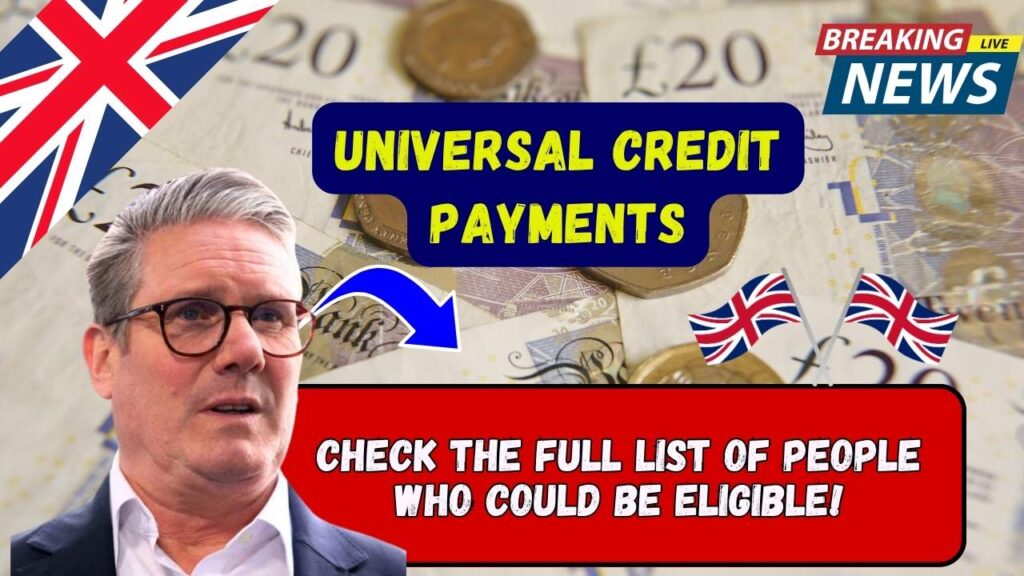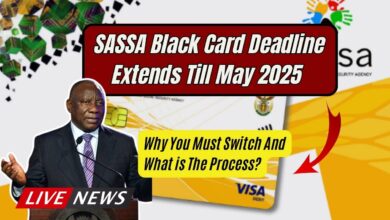Universal Credit Payments: Check the Full List of People Who Could Be Eligible!
Universal Credit Payments – Universal Credit Payments are a major part of the UK’s social safety net, aimed at supporting people who have a low income or are out of work. If you’re wondering whether you qualify or how this benefit works, this guide breaks down the full list of people who could be eligible and offers practical advice on applying, maximizing your payments, and avoiding pitfalls. We’ll cover everything from who qualifies to how Universal Credit interacts with other benefits — explained in a friendly, straightforward style that’s easy to understand.

Universal Credit Payments
| Eligibility Category | Key Details | Additional Info |
|---|---|---|
| Age | 18+ and under State Pension age (some exceptions for 16-17) | Special rules for young adults |
| Income & Savings | Savings below £16,000 | Income and partner’s income affect payments |
| Residency | Must live in the UK and have the right to claim | Includes Channel Islands & Isle of Man |
| Employment Status | Employed, self-employed, unemployed, or unable to work | Means-tested benefit |
| Families & Children | Responsible for children under 16 (or under 20 in education) | Childcare costs may be covered |
| Health & Disability | Health conditions or disabilities impacting work ability | Includes PIP, DLA recipients |
| Couples | Joint claim required if living with a partner | Both incomes considered |
| Students | Limited eligibility depending on course & circumstances | Special rules for non-advanced courses |
Universal Credit is a vital financial support system in the UK that helps millions manage their living costs. Understanding who is eligible, how payments are calculated, and the application process empowers you to get the help you need confidently. By staying informed, meeting your responsibilities, and using available resources, you can make the most of Universal Credit to stabilize your finances and plan for a brighter future.
What Is Universal Credit and Who Is It For?
Universal Credit is a monthly payment designed to help with your living costs if you’re on a low income or out of work. It replaces six older benefits into one system, simplifying the application and management process. Universal Credit supports a broad range of people — from those unemployed to families juggling childcare, from students with special circumstances to individuals with disabilities.
Because it’s means-tested, the amount you receive depends on your earnings, savings, household setup, and other factors. It’s tailored to help you get back on your feet or manage life’s challenges while encouraging you to work or train when possible.
Detailed Eligibility Breakdown
Age Requirements
You’re usually eligible if you’re 18 or over and under the State Pension age. Exceptions apply for 16- and 17-year-olds who:
- Have disabilities or health conditions,
- Are responsible for a child,
- Care for someone who receives disability benefits,
- Don’t have parental support.
Income and Savings Limits
Having savings or capital above £16,000 generally disqualifies you. Savings between £6,000 and £16,000 will reduce payments. Both your and your partner’s income and savings are taken into account if you’re a couple.
Residency Status
Universal Credit is available to those living in the UK, Channel Islands, or Isle of Man with the right to reside and claim public funds.
Employment Status
You can claim Universal Credit if you’re employed (full- or part-time), self-employed, unemployed, or temporarily unable to work due to illness or disability.
Families and Children
If you’re responsible for children under 16 (or under 20 in education), you may get extra support. Childcare costs paid while working or looking for work are also eligible for partial reimbursement.
Health and Disability
If you have a health condition or disability limiting your ability to work, and you’ve been assessed as having limited capability for work, you can receive additional amounts. This also applies if you get benefits like PIP or DLA.
Couples
Couples living together must make a joint claim, with combined income and savings assessed.
Students
Full-time students typically don’t qualify, but exceptions exist for parents, those with disabilities, and others in specific situations.
How Much Can You Get?
Your Universal Credit payment is built around a standard allowance based on your age and whether you’re single or a couple:
- Single under 25: £292.11/month
- Single 25 or over: £368.74/month
- Couple under 25: £458.51/month (joint)
- Couple 25 or over: £578.82/month (joint)
Additional amounts can be added for children, housing costs, disabilities, caring responsibilities, and childcare.
Universal Credit Advances: Help When You Need It Fast
If you’re in financial difficulty while waiting for your first Universal Credit payment (which can take up to five weeks), you can apply for a Universal Credit advance. This is a loan you repay through deductions from future payments.
Sanctions: What They Are and How to Avoid Them?
If you don’t meet your agreed responsibilities, like attending appointments or job searching, your payments could be reduced or stopped temporarily — this is called a sanction. To avoid this, communicate with your work coach, attend meetings, and keep your Universal Credit journal up to date.
Impact on Other Benefits
Universal Credit replaces many legacy benefits but can affect others:
- It replaces Income Support, Jobseeker’s Allowance, Employment and Support Allowance, Child Tax Credit, Working Tax Credit, and Housing Benefit.
- Some benefits like Council Tax Reduction, Free School Meals, and Healthy Start vouchers can still be claimed alongside Universal Credit.
Work Requirements and Expectations
Universal Credit claimants may have work-related requirements depending on their circumstances. This could involve searching for work, preparing for work, or increasing hours. Those with health conditions or caring responsibilities might have reduced or no work requirements.
Recent Policy Changes
The UK government periodically updates Universal Credit policies, such as:
- Changes to work allowances,
- Adjustments for inflation,
- Updates on conditionality rules.
Keep an eye on official announcements to stay informed.
Common Mistakes to Avoid
- Forgetting to report income or changes in circumstances,
- Missing appointments or deadlines,
- Providing incomplete or inaccurate information,
- Delaying your application.
Real-Life Examples
Example 1: Sarah, a single mom with two kids, lost her job. She applied for Universal Credit and received monthly payments to cover living expenses plus help with childcare, allowing her to look for work without stressing about bills.
Example 2: Tom, self-employed with fluctuating income, claimed Universal Credit. His payments adjusted monthly based on his earnings, smoothing out financial ups and downs.
How to Appeal a Universal Credit Decision?
If you disagree with a decision, you can:
- Ask for a mandatory reconsideration by the DWP,
- Appeal to a tribunal if the reconsideration is denied.
Seek help from advice agencies or legal aid for support.
Useful Technology and Tools
- Universal Credit’s online journal helps you track messages and appointments.
- The GOV.UK Benefits Calculator estimates your payments.
- Mobile apps and browser extensions assist in managing your claim.
Community Resources and Support
Local charities, food banks, and advice centers provide additional help. Citizens Advice and Help to Claim services are great places to start for personalized assistance.
Keep Your £440 Attendance Allowance Secure By Following DWP Rules: Check How to Avoid Inconvenience!
DWP £749 Payment for 27 Conditions Released Today: Check Eligibility Criteria and Payment Details!
DWP Cancels 222,000 PIP Payments — Check If You’re Affected and The Reason Behind it!
FAQs About Universal Credit Payments
Q1: Can I get Universal Credit if I’m self-employed?
Yes, but after 12 months, your income is assessed against a Minimum Income Floor.
Q2: Will Universal Credit affect my tax credits?
Universal Credit replaces tax credits; you cannot claim both.
Q3: How often are payments made?
Payments are monthly, usually paid in arrears.
Q4: Can Universal Credit help with rent?
Yes, it includes help with housing costs.
Q5: What if my circumstances change?
You must report any changes immediately to avoid overpayments or sanctions.







